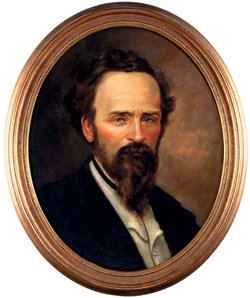 |
| Linus Yale Jr. |
Birth: Apr. 4, 1821, Salisbury, Herkimer County, New York, USA Death: Dec. 25, 1868, New York, New York County (Manhattan), New York, USA
He was born in Salisbury, Herkimer county, N.Y., April 4, 1821. As a boy he showed an aptitude for art. At the age of sixteen he got from a traveling portrait painter a few hints on the use of colors, and this was all the direct instruction he ever received. He soon after became a professional portrait painter, and followed his calling until 1851. He was married in 1844. He never made a disagreeable picture. He had the faculty of choosing the sitter's best moment; his dye was guided by his imagination, and his hand governed by cool discretion. His portraits are like and life-like. He diffused through them his own quality, subtilizing and ennobling. He loved nature, and had a knowledge of rocks and trees beyond science. "Do you know that wood?" he said once, pointing to a picture of his, a blackberry girl leaning against a fence. "No other splits in that way." Such was the delicacy and dexterity of his manipulations that in the opinion of one of the first of American sculptors -- the author of the statue of Washington in Union square, New York -- he might have done even better in sculpture than in painting. With all these gifts a great future seemed to be before Mr Yale, when, in his thirtieth year, he invented a bank lock.
His mind had often been engaged by the subject of locks and safes, owing to the fact that his father was an inventor and manufacturer of locks. He was sure of the value of his invention, and thought by a few years' devotion to the getting it before the public to gain a competence with which afterwards to follow his beloved art for its own sake. But, being vexed by the troubles common to inventors, it was not until shortly before his death that he seemed fully to have succeeded. The patience with which he bore the misrepresentations of rivals was wonderful. Once when asked why he did not prosecute a wealthy firm which was thought to have infringed upon an important patent, he said: "I can do better; I have already made a better invention." In 1855 he picked the celebrated Hobbs's lock, so called. The same year he removed to Philadelphia, and in 1861 to Shelburne Falls. Within the last seventeen years he invented not less than thirty devices in locks alone.
Besides his inventions in locks and safes, and in machinery for their manufacture, he was constantly obtaining patents for other devices which he had not time to use. His portfolios show the activity of his brain. Even his diaries are filled with mechanical drawings, made while travelling; often a face or a charming bit of landscape graces a page. A friend, looking at his drawing of a certain instrument, said: "It is astonishing that a common thing can be so glorified." It was done by such minute and delicate touches as not to show a line.
Among his friends Linus Yale was a constant delight. The letters of condolence with his family written by business men are full of admiration and tenderness, and a great grief seems to have settled down on the workmen in his employ. No man of equal merit was ever less known by the public; none loved in a broader private circle. There was sorrow in a thousand hearts when the New York papers announced his death. Gentle, silent, resolute, cultivate, self-respecting, generous, suave and strong -- a gentleman and a genius -- he cannot be allowed to pass away without some tribute of appreciation.
Source: http://www.findagrave.com/cgi-bin/fg.cgi?page=gr&GRid=52830523/ (slightly edited)
One of the main reasons for the success of the Linus Yale's locks was down to his use of publicity, as is shown in his wikipedia page:
[H]he did live demonstrations to corporate business executives and government officials that showed how he successfully picked the locks that were in operation. Due to these demonstrations and the sheer quality of Yale’s locks, Yale Lock Manufacturing quickly gained business ground. The company’s name was later changed to The Yale and Towne Manufacturing Company, which eventually became part of NACCO Industries.Linus Yale was much like Samuel Colt (the fire-arms manufacturer) in that he was not coy when it came to promoting his own inventions. Samuel Colt made public demonstrations of his products as did Linus Yale. Without this element of self-promotion it's unlikely that his products would have become as popular as they did. While self-promotion might seem like an un-manly activity to engage in, because it tends towards vanity and narccissism, it's important to note that every good idea or invention needs to made known to the public somehow or else it won't be used; ergo some self-promotion/publicity/marketing is an essential at the end of the day.
Cracking the Hobbs Lock
The prominent bank locks of Yale’s day were the Hobbs or Newell locks. In an effort to present his locks over the continued usage of the Hobbs Locks, Yale contacted notable bankers and set up a live demonstration in which he successfully picked a Hobbs Lock. As described by Samuel Hammond, one of the bankers present at Yale’s demonstration, "[he] proved that the Hobbs lock is able to be picked and demonstrated it using a fake wooden key that he made". [1]
Challenge to the World
As part of Yale’s business plan and effort to promote his Bank Locks, Yale presented a challenge to anyone who dared to pick his bank locks. He offered a $3000 (a hefty sum) reward to potential challengers, in the event that his locks were successfully picked.
Source: http://en.wikipedia.org/wiki/Linus_Yale_Jr
[End.]
No comments:
Post a Comment